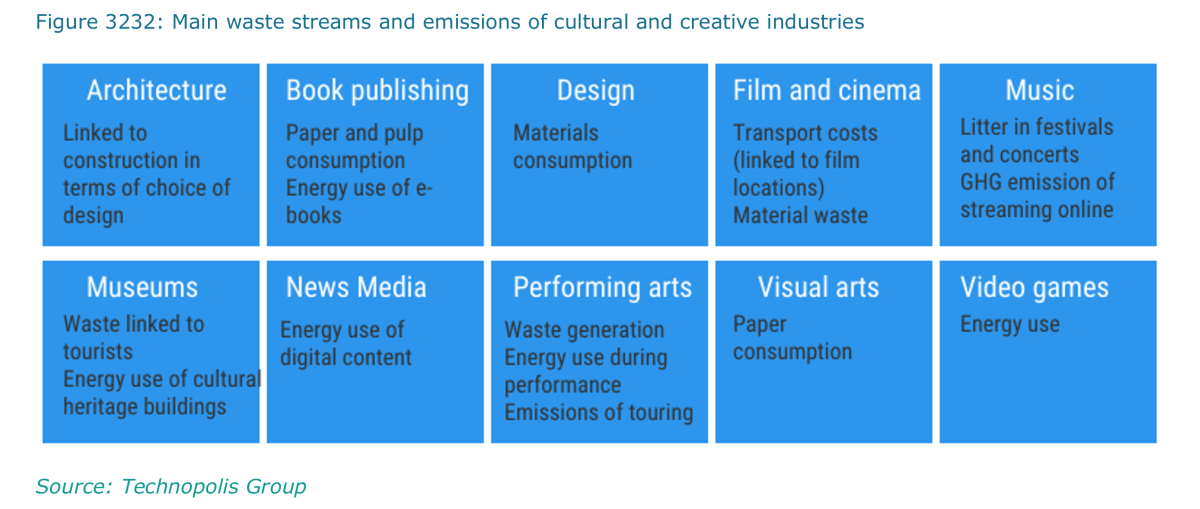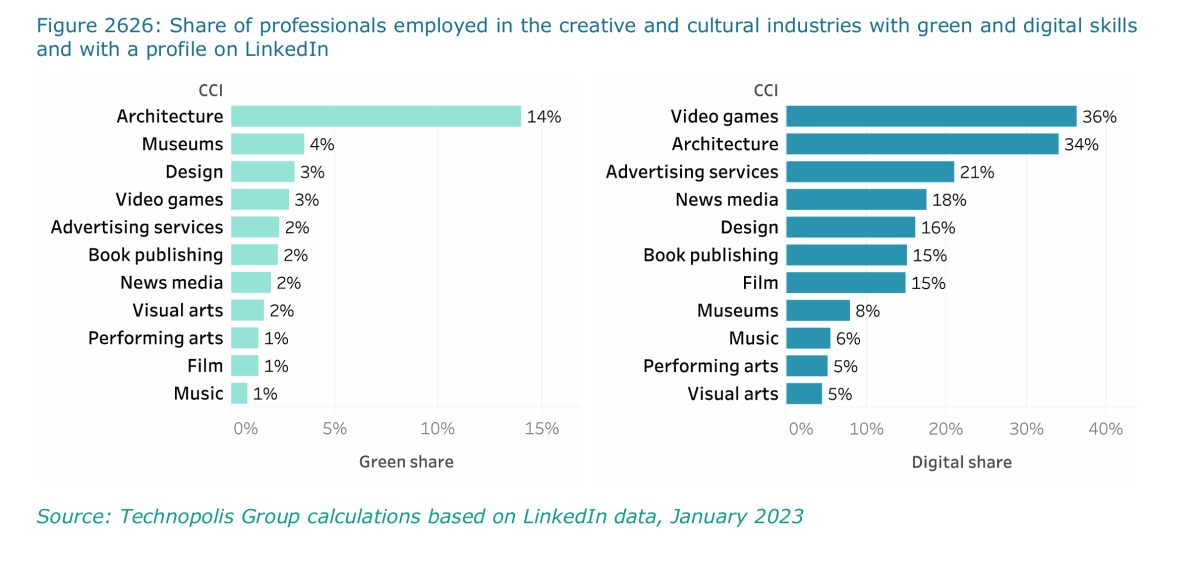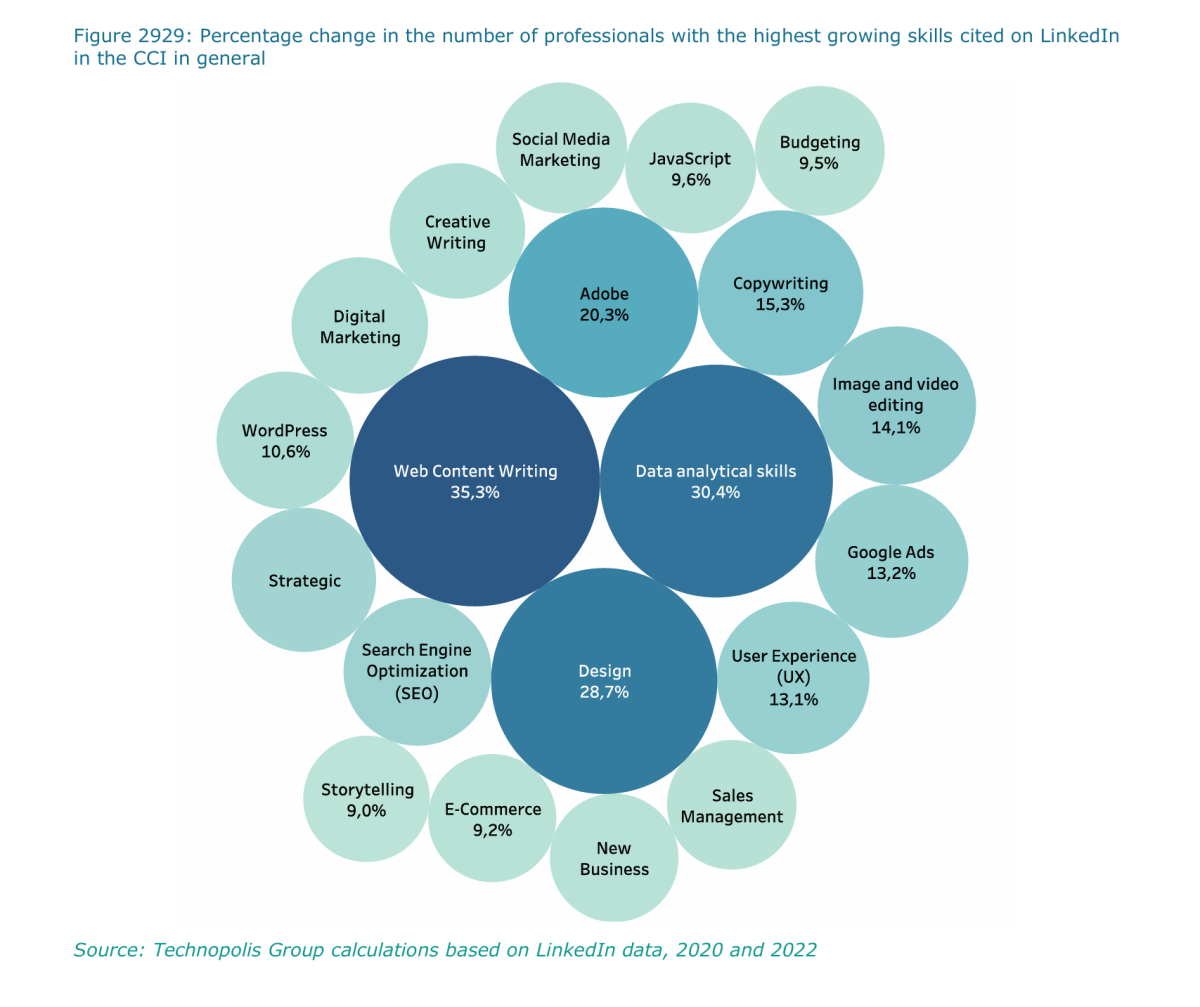Architects lead the way in both the green and the digital transition. Video-games lead the CCI in digital skills and investments. A new EU report, titled “Monitoring the twin transition of industrial ecosystems”, highlights that CCI professionals are increasingly taking action over the twin transition. 51% of the report’s respondents indicated to have increased their investments dedicated to green transition and environmental sustainability over the past five years.
The environmental impact of the CCI is relatively low, the fashion industry excepted. They account for approximately 1-3% of the impact of all industries. Nevertheless, CCI environmental footprint is increasing mostly due to travel emissions and material waste, especially on the occasion of events such as such as music festivals, concerts, and tours.

Creatives and especially designers are considered by policymakers as innovation-drivers offering out of the box solutions. This is why the New European Bauhaus aims at involving especially designers.
Product design dictates up to 80% of its life-cycle environmental impact
In another example, COLDPLAY organized a net-zero carbon footprint for their world tour ‘Music of the Spheres’. They released a sustainability plan including a “direct-air carbon capture technology by Climeworks, whose machines remove carbon dioxide from the air and store it safely or package it for commercial use in products such as fizzy drinks. The band has used a kinetic dance floor that uses human movement to create electricity.”
CCI environmental footprint increases also because of the shift to digitalisation and the increased use of online services such as streaming, especially in publishing activities and IT/ICT-related activities (including broadcasting, video games). Investment in CCI tech companies demonstrated an overall increase between 2015-2020, with a sharp rise between 2019 and 2020, followed by a decrease towards 2022.
The report’s survey demonstrated that
“65% of SMEs in the CCI have increased their investments in digital technologies during the past five years, which is a high result across all industrial ecosystems”.
Video games, followed by media technology and book publishing championed capital investment in the digital transition. Technologies mostly adopted by SMEs in the CCI include online platform technologies (23.1%), cloud software (19.7%), big data and artificial intelligence (10.5%).
CCI job-market reflects the twin transition
CCI job seekers will need to upscale both their digital and green skills.
To date, architects account for the highest share of people employed in the CCI with skills relevant for the green transition (14%). The lowest appears in music, film, and the performing and visual arts (1%). Architects and video-games professionals lead the way in the digital skills most valued in the CCI.

CCI jobseekers will need to upscale as the job market increasingly requires green skills such as corporate social responsibility, energy efficiency, and environmental regulations. The digital skills mostly wanted include web analytics, social media analytics and digital media. Advanced digital skills sought after in the CCI job market include database management, computer programming and cloud technologies. There is already a trend of creatives developing their skills, mainly in web content writing and data analysis, as demonstrated in the image following.

Background
This report is a contribution to the ‘European Monitor of Industrial Ecosystems’ (EMI) project, initiated by the European Commission's Directorate General for Internal Market, Industry, Entrepreneurship, and SMEs, in partnership with the European Innovation Council and SMEs Executive Agency (EISMEA).
It is authored by Carlo Vuijlsteke, Isabelle de Voldere, IDEA Consult, Kincsö Izsak, Technopolis Group with data analysis supported by: Carmen Moreno and Yari Borbon, Technopolis Group.
Find more here
Image 1 by Jukka Niittymaa - Free for use under the Pixabay Content License
Images 2-4 Courtesy of the Report: Monitoring the twin transition of industrial ecosystems.











